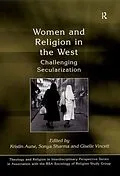What is the relationship between women and secularization? In the West, women are abandoning traditional religion. Yet they continue to make up the majority of religious adherents. Accounting for this seeming paradox is the focus of this volume. If women undergird the foundations of religion but are leaving in large numbers, why are they leaving? Where are they going? What are they doing? And what's happening to those who remain? Women and Religion in the West addresses a neglected yet crucial issue within the debate on religious belonging and departure: the role of women in and out of religion and spirituality. Beginning with an analysis of the relationship between gender and secularization, the book moves its focus to in-depth examination of women's experiences based on data from key recent qualitative work on women and religion. This volume addresses not only women's place in and out of Christianity (the normal focus of secularization theories) but also alternative spiritualities and Islam, asking how questions of secularization differ between faith systems. This book offers students and scholars of religion, sociology, and women's studies, as well as interested general readers, an accessible work on the religiosity of western women and contributes fresh analyses of the rapidly shifting terrain of contemporary religion and spirituality.
Autorentext
Kirstin Aune is Senior Lecturer in Sociology at the University of Derby, UK. Sonya Sharma is a Postdoctoral Research Fellow at the University of British Columbia, Canada and Giselle Vincett is a Postdoctoral Research Fellow at the University of Edinburgh, UK.
Zusammenfassung
This book presents a longitudinal study dealing with developmental changes within and between self-concepts and their relation to personal functioning. Within the psychological literature -- and the developmental literature in particular -- the interest in the ideas people hold about themselves and their relation with personal functioning is rapidly growing. This interest is reinforced by the emphasis on individuality in Western society. The self-system is now thought to consist of a collection of self-concepts in which a distinction is made between domain-specific self-concepts -- the real and ideal -- and context-related self-concepts -- the academic, the athletic and the social. It is also considered to be subjective rather than objective. This subjective self involves characteristics such as continuity and distinctiveness from others. These characteristics have been the primary focus of recent research. In existing literature on the development of the self-system, little is known about the structural characteristics -- that is, developmental changes in the interrelationships among domain-specific and context-related self-concepts, or between and within self-concepts. Similarly, little information is available about the relationships between individuals' real and ideal self concepts, their perceived concepts of others, and the actual ideas others have about the same individuals. This book integrates hitherto separate and different components or aspects of self-knowledge into one encompassing, multidimensional self-system.
Inhalt
Contents: Introduction: women and secularization: one size does not fit all, Giselle Vincett, Sonya Sharma and Kristin Aune; Part 1 Christianity: Religious change in the West: watch the women, Penny Long Marler; Singleness and secularization: British evangelical women and church (dis)affiliation, Kristin Aune; When young women say 'yes': exploring the sexual selves of young Canadian women in Protestant churches, Sonya Sharma; Vocational habit(u)s: Catholic nuns in contemporary Poland, Marta Trzebiatowska. Part 2 Alternative Spiritualities: The spiritual revolution and the New Age gender puzzle: the sacralization of self in late modernity (1980-2000), Dick Houtman and Stef Aupers; The soul of soulless conditions: paganism, Goddess religion and witchcraft in Canada, Siân Reid; The fusers: new forms of spiritualized Christianity, Giselle Vincett; 'Because I'm worth it': religion and women's changing lives in the West, Linda Woodhead. Part 3 Islam : Counting women with faith: what quantitative data can reveal about Muslim women in 'secular' Britain, Serena Hussain; Real Islam in Kazan: reconfiguring the modern, knowledge and gender, Sarah Bracke; Being Muslim and being Canadian: how 2nd generation Muslim women create religious identities in 2 worlds, Rubina Ramji; Being seen by many eyes: Muslim immigrant women in the United States, Garbi Schmidt; Afterword, Mary Jo Neitz; Index.
